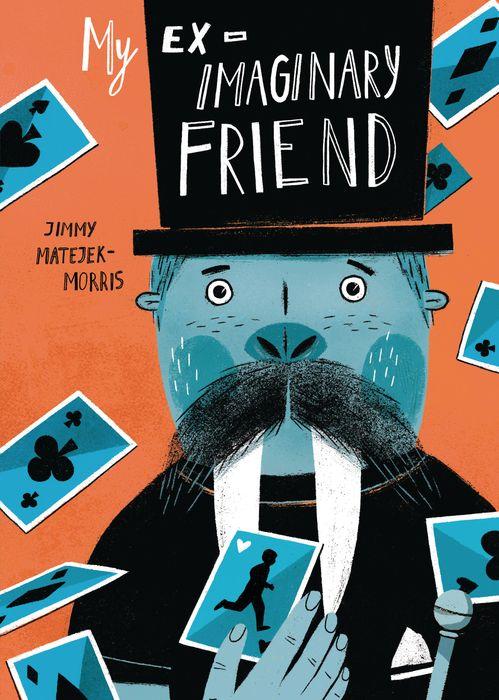Book Review: My Ex-Imaginary Friend by Jimmy Matejek-Morris

Publisher’s description
Eleven-year-old Jack thought he had outgrown his imaginary friend, George—until his dad also disappears from his life. His mom’s bipolar disorder isn’t being properly treated, so while in the throes of a manic episode, she ditches Jack with his aunt, uncle, and cousins. Jack decides that only George can help him figure out where people go when others stop believing in them—and how Jack can put his family back together.
Meanwhile, the imaginary George—half-walrus, half-human, all magic—has a problem of his own: with nobody to believe in him, he is slowly disappearing. Rejoining Jack is his only hope for survival. Or is it?
ADVERTISEMENT
ADVERTISEMENT
Amanda’s thoughts
Well, my heart broke for both Jack (real) and George (imaginary) as I read. Lots of us have had imaginary friends in life (mine were Boopsy, Bopsy, Beepsy, Goopsy, Gina, and Deena) and maybe have thought about how they affected our lives, but what about how we affect the life of that imaginary friend? How we create it, shape it, and, eventually, end it. Jack needs George in his life, but George needs Jack, too. Without him, he might just fade away.
Jack is dumped on a lawn near his aunt and uncle’s when his mother, in a manic episode, tells him she will be back in a week (saying that Jack is too much, that it’s all too much). Jack has been sheltered from what is going on with his mom, though he certainly has observed very dark periods for her as well as pretty unstable highs. He’s still reeling from his absent father having found “someone special,” which makes Jack feels extra unspecial, abandoned, and replaced. Bad timing for mom to leave, too. But maybe, with old imaginary friend George, they could find his parents. Maybe George can help fix everything. Working together makes sense, despite having been estranged for some time. Both Jack and George feel alone, abandoned. Both Jack and George need to be seen, be believed in. But Jack is just a young kid. And George is just an imaginary walrus-person. Can they make things okay for Jack, or do the living humans in his life need to step up and do what an imaginary friend and a child cannot do (and should not have to do)?
Narrated by both Jack and George, this complex story of family, care, belonging, and mental illness deftly illustrates how important it is to address the truth and the reality of mental illness. Jack’s mother has bipolar disorder and keeping this truth from him, keeping him in the dark about what that means for her and for him, has terrible consequences (again, see the whole heart breaking for Jack thing). Sheltering children is not protecting them. In fact, in this case, it’s actively harming Jack. His aunt and uncle reveal that his mother has had episodes like this, that she’s probably not on her meds, that whenever she comes back she won’t be the same, that she’ll need time to get help. That’s a lot for a kid to have been navigating alone with his single parent and yet be kept in the dark about.
This sophisticated and painful look at loving someone with a mental illness and the many missteps a family can make shows the challenges of loving someone during difficult times and the dangers of mental illness not being properly treated or properly addressed. I hope both George and Jack get the family and attention they deserve.
Review copy (ARC) courtesy of the publisher
ISBN-13: 9781541596993
Publisher: Lerner Publishing Group
Publication date: 02/02/2021
Age Range: 9 – 10 Years
Filed under: Uncategorized
About Amanda MacGregor
Amanda MacGregor works in an elementary library, loves dogs, and can be found on Twitter @CiteSomething.
ADVERTISEMENT
ADVERTISEMENT
SLJ Blog Network
Name That LEGO Book Cover! (#53)
Cover Reveal and Q&A: The One and Only Googoosh with Azadeh Westergaard
K is in Trouble | Review
Fighting Public School Book Bans with the Civil Rights Act
ADVERTISEMENT







